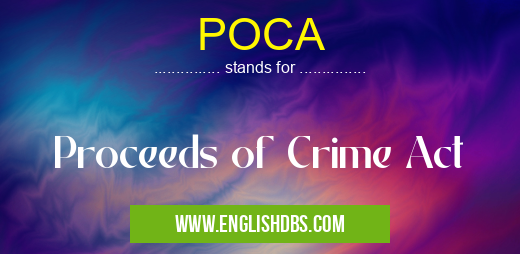What does POCA mean in LAW & LEGAL
POCA stands for Proceeds of Crime Act, a comprehensive piece of legislation enacted in the United Kingdom to combat money laundering and other financial crimes. Its primary objective is to prevent criminals from benefiting from their illicit activities and to facilitate the recovery of assets obtained through illegal means.

POCA meaning in Law & Legal in Governmental
POCA mostly used in an acronym Law & Legal in Category Governmental that means Proceeds of Crime Act
Shorthand: POCA,
Full Form: Proceeds of Crime Act
For more information of "Proceeds of Crime Act", see the section below.
What does POCA Stand for?
POCA is an acronym that expands to Proceeds of Crime Act. It is a powerful legal instrument that empowers law enforcement agencies to investigate, seize, and confiscate assets linked to criminal activities.
Role of POCA
POCA plays a crucial role in the fight against financial crime by:
- Preventing Money Laundering: It criminalizes the concealment, transfer, or acquisition of property derived from unlawful activities, making it more difficult for criminals to legitimize their ill-gotten gains.
- Facilitating Asset Recovery: POCA provides legal mechanisms for law enforcement to seize and confiscate assets that are suspected of being obtained through criminal means, effectively depriving criminals of their financial resources.
- Punishing Financial Crime: Individuals and organizations found guilty of violating POCA face severe penalties, including imprisonment and financial sanctions, serving as a strong deterrent against financial misconduct.
Essential Questions and Answers on Proceeds of Crime Act in "GOVERNMENTAL»LAW"
What is the Proceeds of Crime Act (POCA)?
POCA is a comprehensive piece of legislation in the United Kingdom that aims to prevent and combat money laundering and terrorist financing. It gives law enforcement agencies wide-ranging powers to investigate, seize, and recover criminal assets.
What does POCA cover?
POCA covers a wide range of offenses, including drug trafficking, fraud, bribery, insider trading, and terrorism. It also targets individuals and organizations involved in money laundering and terrorist financing, regardless of the underlying crime.
How does POCA work?
POCA empowers law enforcement agencies to:
- Investigate suspected money laundering and terrorist financing activities.
- Freeze and seize assets believed to be derived from criminal activity.
- Recover stolen or laundered assets through civil proceedings.
- Prosecute individuals and organizations involved in money laundering and terrorist financing.
What are the key features of POCA?
POCA's key features include:
- The creation of a financial intelligence unit (FIU) to collect and analyze suspicious activity reports.
- The introduction of a "unexplained wealth order" that allows authorities to seize assets that cannot be legally accounted for.
- The expansion of powers to investigate and prosecute money laundering and terrorist financing offenses.
How has POCA impacted the UK's fight against crime?
POCA has been a powerful tool in the UK's efforts to combat money laundering and terrorist financing. It has helped to:
- Disrupt criminal networks and seize their assets.
- Recover stolen and laundered money.
- Prevent the financing of terrorism.
Final Words: POCA is a comprehensive and effective tool in the fight against financial crime, enabling law enforcement agencies to disrupt criminal enterprises, recover illicit assets, and deter individuals from engaging in financial misconduct. Its focus on seizing the proceeds of crime has been instrumental in reducing the profitability of criminal activities and safeguarding the integrity of the financial system.
